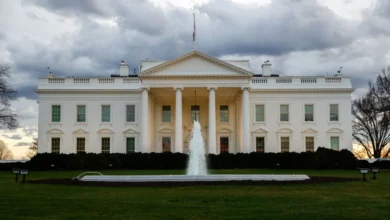Two weeks after firing its illustrious editor-in-chief Ibrahim Eissa, Al-Dostour, a newspaper known for its anti-Mubarak stance, is still facing an ongoing feud between journalists and management.
On Thursday, the newspaper's staff started touring different media' premises to gather support for their campaign "against silencing newspapers". Journalists also plan to organize a protest on Saturday at the mausoleum of national leader Saad Zaghloul, which is a symbolic site for the rise of liberal politics in Egypt.
The new chairman of the paper, Reda Edward, refuses to implement the staff's primary demand–the return of their editor-in-chief. Eissa was dismissed on 4 October, shortly after businessman and chairman of the liberal opposition Wafd Party Elsayed al-Badawy purchased the newspaper. In mid-October, Badawy announced his withdrawal from the publication and the sale of his shares to Reda Edward, who is also a highly placed member of the Wafd Party and a close associate of Badawy.
Al-Dostour journalists staged a protest on Wednesday in front of the Wafd Party premises, chanting slogans against both Badawy and Edward. Party officials said that the Wafd has nothing to do with the newspaper's crisis. "The party has no dealings with this issue," said Mounir Fakhry Abdel Nour, the party's secretary-general.
“The journalists have a set of demands; we are all (as a syndicate) united in those demands. The problem of Al-Dostour has highlighted many of the current issues with the Egyptian press, among them, the clash between the interests of businessmen and journalists,” said Yehia Kallash, a member of the journalists syndicate.
"Our journalists' struggle is more than a normal fight for better working conditions…it's rather a stand for our message and dignity," said Eissa, the sacked chief editor at a conference at the journalists' syndicate late on Monday.
Al-Dostour’s journalists have submitted a list of eight demands for the new management to consider. These include having official contracts with adequate salaries for around 150 journalists who are participating in the sit-in, keeping the political line of the paper, and reinstating Eissa as the editor-in-chief and Ibrahim Mansour as the managing editor.
“We’re clinging to our rights, and to the political line of our newspaper. All that’s been happening has been a game to close our newspaper or to lower the standards of our professional and political freedom,” said Tareq Sayed a journalist from Al-Dostour.
“When I joined this newspaper, I knew its political and professional line…now I see how this new management is wavering from the line that I have worked on, and I have the right to protest,” he added.
The new chairman of the paper has recently declined further negotiations with the journalists. “The door is closed to negotiations with the syndicate," Edward told Al-Masry Al-Youm. "And I will not go back for more with the syndicate board, as they are not serious in their demands.”
“I may return to negotiations if the syndicate sets certain demands without the usual daily additions and changes, which are a waste of my time, without finding a solution to the problem,” he added.
Earlier this week, the Supreme Press Council, which regulates media issues, sent a reprimand to Al-Dostour's new management for allowing the paper to appear on newsstands without the name of an editor-in-chief, which is a legal requirement. The warning stated that the newspaper could be shut down for this reason. This move followed journalists' complaints against the council, claiming that it had been co-opted by Edward because it hadn’t issued this warning. Edward responded by appointing an executive editor-in-chief.
Several political figures have offered to mediate to resolve the crisis. Gamila Ismail, the ex-wife of opposition figure Ayman Nour, announced her readiness to buy Edward's shares. Also, Mohamad al-Sadat،head of the Reform and Development Party offered to pay LE20 million to buy the newspaper that was sold two months ago for LE16 million. Edward declined both offers.
“Reda Edward’s behavior is not self-motivated; he can’t have any personal interest in attacking Al-Dostour… clearly, this is a role that he’s playing," said Yasser Fathi, a lawyer supporting Al-Dostour's journalists' case. "Al-Dostour’s message was seriously damaging to the regime, that is why they sent someone like Edward to deflect the paper from its course," he added.
Analysts say that the newspaper's latest issues carry a different tone. “It’s obvious that the newspaper has changed a lot in the last two weeks," said Gamal Eid, head of the Arabic Network for Human Rights Information. "The boldness, sincerity, and style that used to characterize it are not there anymore, and even most of the journalists that used to write for the paper are no longer doing so."
Editorials in the daily paper have a history of being inflammatory, particularly when addressing President Hosni Mubarak.
"There is no proof that the latest problem was manufactured by the state. However, there is a lot of evidence that the state has been against the paper and against Eissa," added Eid. The newspaper has been sued 30 times in the past five years, once resulting in Eissa being sentenced to up to six months in jail. A presidential amnesty cancelled the verdict.
"This is a new step by the state to muzzle the media," said Eid, pointing out that a month earlier a satellite channel, On-TV, had stopped Eissa's program from being aired. Another critical program, al-Qahira al-Youm, was also stopped from appearing for political reasons, the program makers said.
"It’s not the newspaper that Eissa used to work for, it’s the school of journalism that Eissa applies," concluded Gamal Eid, "Dostour and Eissa are two faces of one coin, and you cannot separate them from each other."



